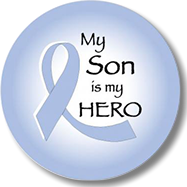
— STOMACH CANCER AWARENESS —
LEARN MORE TODAY!
Hereditary diffuse gastric cancer (HDGC) is an inherited cancer syndrome that leads to an increased risk for both diffuse gastric cancer and lobular breast cancer. Patients who inherit the genetic mutation for HDGC are at high risk for developing stomach cancer at a young age.
Stomach cancer makes up only about 10% of all cancers but its' the 2nd leading  cause of cancer death - that's because it is difficult to diagnose. Hereditary Diffuse Gastric Cancer occurs in 1 - 3% of that 10% making it even more rare. It's this special group my family falls into - carriers of a mutation in the CDH1 gene. Typically families suffer through 2 or 3 or more deaths before they begin to consider it being genetic. Fortunately and unfortunately, we were able to learn sooner because of losing Billy at age 20. His sacrifice is saving other family members and for that we are all grateful.
cause of cancer death - that's because it is difficult to diagnose. Hereditary Diffuse Gastric Cancer occurs in 1 - 3% of that 10% making it even more rare. It's this special group my family falls into - carriers of a mutation in the CDH1 gene. Typically families suffer through 2 or 3 or more deaths before they begin to consider it being genetic. Fortunately and unfortunately, we were able to learn sooner because of losing Billy at age 20. His sacrifice is saving other family members and for that we are all grateful.
Billy had hereditary diffuse gastric cancer which is an aggressive cancer that grows rapidly in the cells of the stomach wall. Unlike other cancers that form a mass or a tumor, these cancer cells are diffused – spread or scattered widely or thinly – making it difficult to diagnose. It tends to affect younger people with a family history of the disease or those having a genetic syndrome.
HDGC leads to a cancer called diffuse-type, signet ring cell gastric adenocarcinoma. These signet ring cells appear as isolated cells or in small clusters in the lining of the stomach. Unfortunately, the diffuse type of gastric cancer associated with HDGC is difficult to diagnose because the cancer is not visible on upper endoscopy (looking into the stomach with a small camera). For this reason, most cases of diffuse gastric cancer are diagnosed at late stages (III or IV), and associated with a lower survival rate.
Women from HDGC families should be followed by oncologists or breast surgeons and have clinical breast exams regularly. Screening with yearly breast MRI, which can be combined with mammograms, is recommended starting at age 30. There is a possible role for preventive hormone-blocking medications to reduce the risk of lobular breast cancer in CDH1 mutation carriers. If there are many cases of breast cancer in the family, prophylactic mastectomy may also be considered, but mastectomy is not routinely recommended.
Research on the genetics, diagnosis, and treatment of HDGC is ongoing. Centers of Excellence have been established worldwide and experts from the International Gastric Cancer Linkage Consortium continue to work together to develop new guidelines and recommendations for patients and families affected by HDGC.
To Learn More, Visit No Stomach For Cancer
Resource: www.nostomachforcancer.org

©2016. All Rights Reserved.
